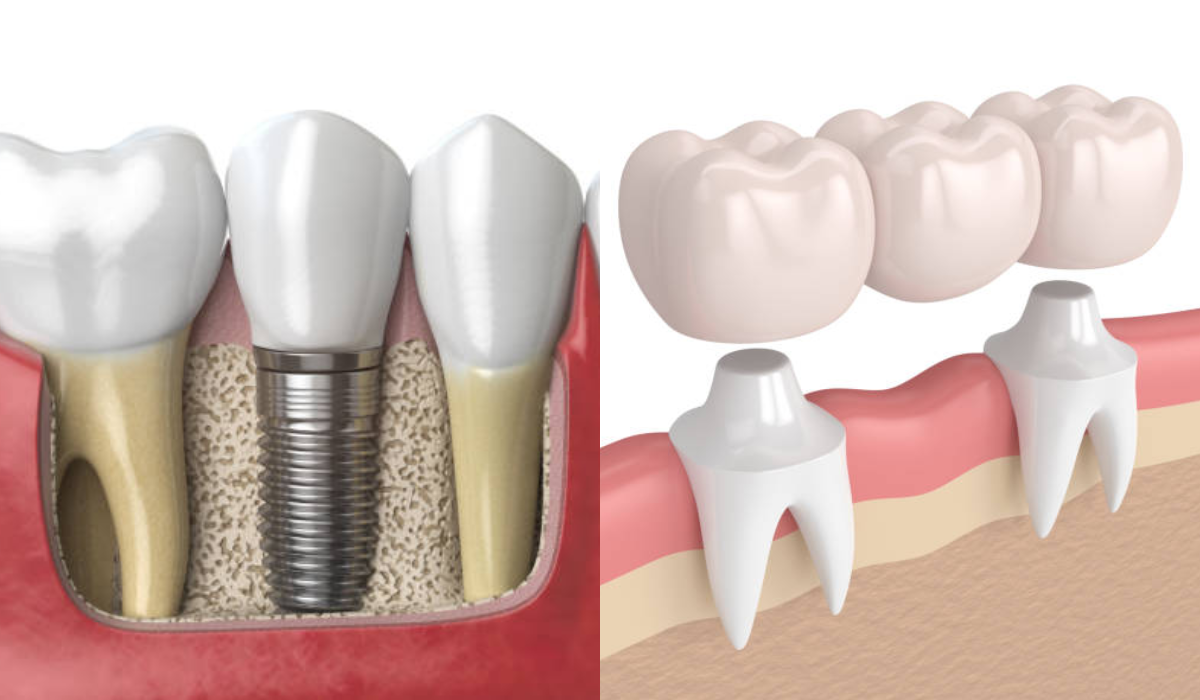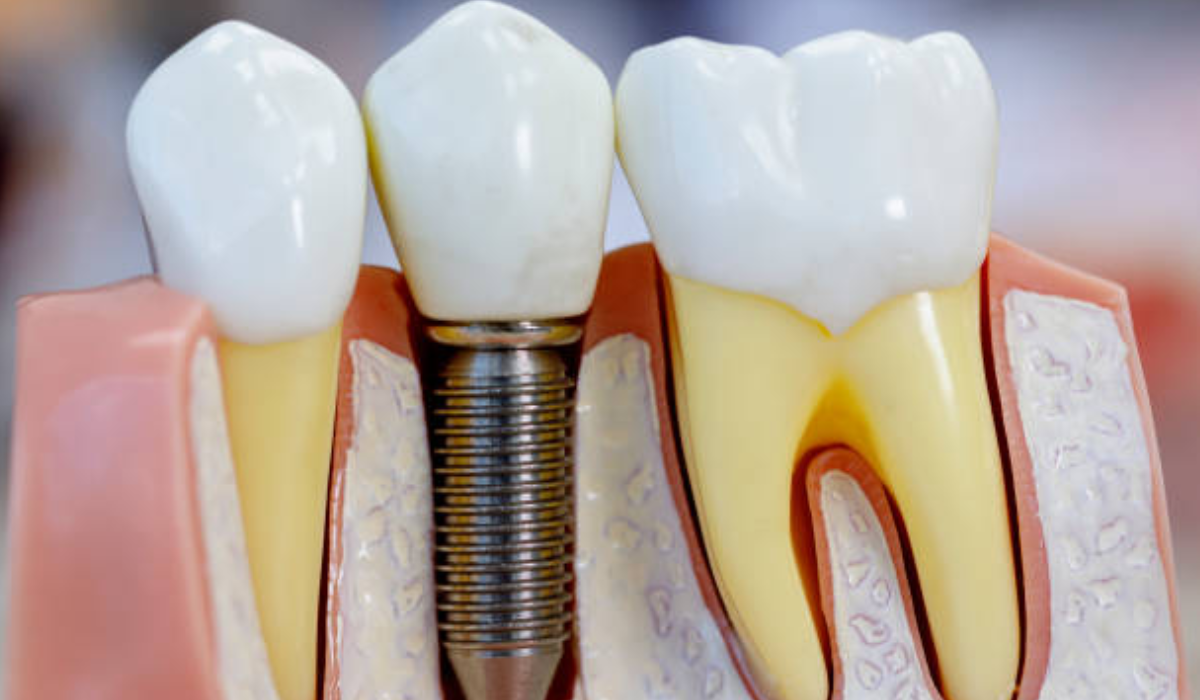The choice between dental implants and bridges is critical. When it comes to replacing missing teeth, Both methods successfully restore not just your smile but also the functionality of your teeth. However, they range widely in terms of approach, cost, length, and effect on overall dental health. Understanding these distinctions will help you make the best decision for your individual needs and objectives.
At a reputable dental clinic in Whitefield, you can compare dental implants and bridges to choose which is ideal for you. Dental implants provide a long-lasting, natural-looking solution, but they require surgery and a longer treatment period. Bridges, on the other hand, are less invasive and faster to install, but they may need to be replaced more frequently and can harm surrounding teeth. This article will walk you through the advantages and cons of each choice, allowing you to make an informed decision that will result in the best possible outcome for your oral health.
Understanding Dental Implants
Dental implants are a modern solution to tooth loss, acting as prosthetic roots made of titanium that are surgically implanted into the jaw. This unique approach allows the implant to spontaneously join to the bone, a process known as osseointegration. Once this integration is complete, the implant serves as a secure and long-lasting basis for a dental crown that duplicates the visible area of a natural tooth. The result is a tooth replacement that not only looks and feels like a genuine tooth but also functions like one, providing long-term durability and comfort.
Dental implants are a popular choice for those looking for a long-term and dependable solution to lost teeth. At a renowned dental clinic in Bangalore, competent professionals can walk you through the implant process, ensuring that you have a restored smile that blends in with your original teeth. Whether you’re missing one or more teeth, implants offer a stable and aesthetically beautiful solution that improves both your dental health and your overall confidence.
Understanding Dental Bridges
Dental bridges are a common and successful method for filling gaps caused by lost teeth. These prosthetic devices consist of one or more artificial teeth, known as pontics, which are held in place by dental crowns that are linked to the surrounding real teeth. The surrounding teeth support the bridge, providing stability and allowing for a seamless integration with the rest of your mouth. This method offers a rapid and non-invasive tooth replacement alternative, making it a popular choice for those looking to restore dental function and beauty without undergoing surgery.
Bridges, unlike dental implants, do not require surgery and may typically be completed in a few visits to the dentist. If you’re thinking about this option, a trained dentist in Whitefield can offer expert advice and care, helping you through the process and guaranteeing a great experience. Dental bridges are a convenient operation that restores not just your smile but also your ability to chew and speak comfortably, making them a popular choice for many patients.
The Process of Getting Dental Implants
The procedure of acquiring dental implants is a multi-stage adventure that normally lasts several months, assuring a secure and long-lasting outcome. Here’s the step-by-step breakdown:
Consultation and Evaluation: Your dentist will do a thorough evaluation of your overall oral health, take X-rays, and decide whether you have sufficient bone density to sustain the implant.
Surgical Placement: Once you’ve been cleared for the operation, the titanium implant is surgically implanted into the jawbone using local anesthesia. This implant functions as an artificial root for your new tooth.
Healing phase: Following surgery, a healing phase is required to allow the implant to integrate with the bone, a process known as osseointegration. This period usually lasts a few months, and a temporary crown may be used to maintain aesthetics and functionality.
Abutment Placement: Once osseointegration is complete, an abutment, or connector, is connected to the implant. This piece will support the final crown.
Crown Placement: Finally, a custom-made crown is securely affixed to the abutment to finish the implant procedure and restore your smile.
The Process of Getting Dental Bridges
A dental bridge is a quicker and less intrusive surgery than implants. Here’s what to expect throughout the process:
Consultation and Evaluation: The process begins with your dentist analyzing your oral health, which includes your teeth and gums. Impressions are taken to manufacture the bridge, which results in a precise fit and superb smile restoration.
Tooth Preparation: Next, the teeth adjacent to the gap, known as abutment teeth, are replaced. During this stage, the abutment teeth are prepared to accept the crowns that will secure the bridge.
Impression and Temporary Bridge: An impression of your prepared teeth is taken to create a replica of the bridge. In the meantime, a temporary bridge protects your teeth and preserves your beauty while the permanent bridge is being built.
Permanent Bridge Placement: Once the custom-made bridge is complete, it is methodically placed and adjusted to ensure a perfect fit. The next step is to affix the bridge to the abutment teeth, completing the therapy and restoring oral function and beauty.
Pros and Cons of Dental Implants
Pros:
Longevity: One of the most notable advantages of dental implants is their endurance. With proper care, they can last a lifetime, making them an excellent long-term investment in your dental health.
Real Appearance: Implants are meant to appear and feel like real teeth. This ensures that your grin is not only appealing but also comfortable and natural.
Preserve Jawbone: Implants help to retain the integrity of your jawbone by stimulating it, reducing bone loss that often occurs following tooth extraction.
No Impact on Adjacent Teeth: Implants do not affect adjacent teeth, as opposed to bridges, which need the alteration of adjacent teeth.
Cons:
Cost: Dental implants are often more expensive than other tooth replacement choices, such as bridges.
Surgical Procedure: The technique entails surgery, which carries some risk and requires a longer recovery period than non-surgical alternatives.
Time: The implant process takes several months to complete, from first implantation to final crown installation, due to the steps involved and the healing period.
Pros and Cons of Dental Bridges
Pros:
Quicker Process: One of the primary benefits of dental bridges is their rapid completion. The entire procedure may usually be completed in a few visits to the dentist, making it an attractive alternative for people seeking a faster treatment.
No Surgery: No surgery is required for bridges, as opposed to dental implants. This reduces the invasiveness of the operation and makes it more acceptable to patients.
Cost: Bridges are typically less expensive than dental implants, making them an enticing option for people on a tight budget or looking for a more affordable tooth replacement treatment.
Cons:
Longevity: While bridges are successful, they typically last 10 to 15 years before needing to be replaced. This is shorter than the longevity of dental implants.
Impact on Adjacent Teeth: The technique involves altering the adjacent teeth, known as abutment teeth, which may weaken them over time.
Bone Loss: Bridges do not stimulate the jawbone in the same way as implants do, which might result in bone loss in the area where the teeth are missing, compromising long-term oral health.
Conclusion: Making the Right Choice for Your Dental Needs
Choosing between dental implants and bridges is a critical decision that should be based on your unique situation, finances, and long-term dental goals. Dental implants are a more permanent and natural-appearing alternative, making them ideal for anyone searching for a long-term, aesthetically acceptable treatment. However, they are more expensive and require lengthier treatment times. Dental bridges, on the other hand, offer a faster and less intrusive alternative, making them suitable for people who require a speedy remedy. However, they may not survive as long and may eventually influence adjacent teeth.
Consult a competent specialist if you want to make the best decision for your oral health. A trustworthy dental clinic in Whitefield can assist you in assessing your oral health, exploring your options, and selecting the ideal solution for your lifestyle and objectives. Whether you choose implants or bridges, both aim to restore your smile and improve your overall quality of life, allowing you to make an informed choice based on your specific needs.
Growing Smile Dentists, Whitefield is a well-known dental clinic that offers pediatric dentistry. Many parents are happy with the friendly and caring service offered by Growing Smile Dentists, shown with good online reviews praising the doctor’s patience and attention to child comfort.


